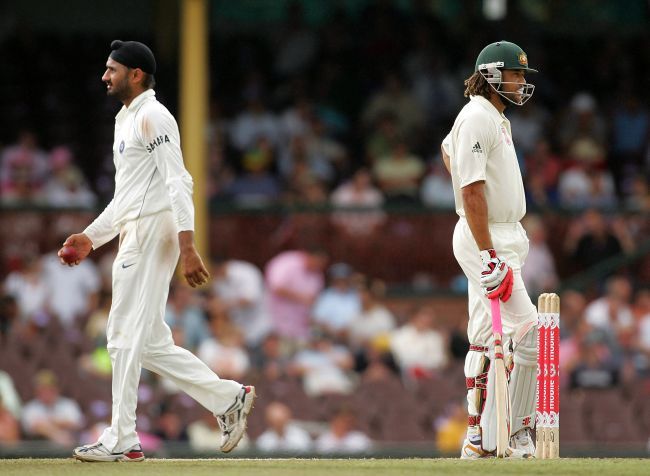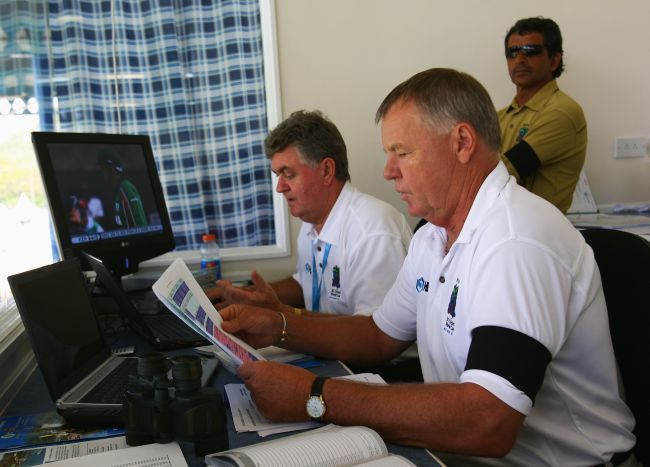
Prime witness to one of the biggest controversies that rocked Indian cricket, Sachin Tendulkar has finally spoken about the anger and sense of betrayal he felt during the 'Monkeygate scandal' in Australia, revealing that he took the lead in threatening a boycott of the tour at the peak of the furore.
Writing in his autobiography, Playing It My Way, Tendulkar recalled the storm that threatened to blow away the cricketing ties between India and Australia after the hosts complained that all-rounder Andrew Symonds had been racially abused by Harbhajan Singh during the second Test in Sydney.
"Anil Kumble (the then captain) and I took the lead and it was unanimously decided that we would boycott the tour if Bhajji's ban was upheld," Tendulkar writes in the book published by Hachette India.
Symonds had been trying to provoke Harbhajan

Detailing the incident as it happened, Tendulkar said Symonds had been trying to provoke Harbhajan for quite a while before the Indian's patience finally ran out during the second Test in Sydney.
"I want to state very clearly that the incident arose because Andrew Symonds had been continually trying to provoke Bhajji and it was inevitable that the two would have an altercation at some point. While walking up to Bhajji to try to calm things down, I heard him say Teri maa ki (Your
mother...) to Symonds. It is an expression we often use in north India to vent our anger and to me it was all part of the game," the batting maestro said.
"...That was the start of the controversy that almost caused the tour to be called off.
"I thought the matter had ended with Bhajji's dismissal and later I was surprised when I was told that the Australians had lodged a formal complaint at the end of that day's play, apparently alleging that Bhajji had called Symonds a 'monkey', which was being treated as a racial insult," he added.
Unsportsmanlike conduct

Tendulkar also took a dig at the Australian cricketers' conduct during the high-voltage match, stating that it was "unsportsmanlike".
"Mind you, there is little doubt in my mind that we would have drawn had it not been for what seemed to us to be mistakes by the umpires and some rather unsportsmanlike conduct by a few of the Australian players.
"Rahul Dravid was given out caught behind off Symonds for 38 by umpire Bucknor when his bat seemed to be a fair distance away from the ball. The wicketkeeper Adam Gilchrist was standing up to the stumps at the time and was in the best position to see if the ball had touched Rahul's bat," Tendulkar recalled.
"Yet he who prided himself on walking off if he nicked the ball appealed for the caught-behind and to our disbelief we saw the umpire raise the finger. It was a shocking decision. Some of us actually wondered if Rahul had been given out lbw."
‘Mike Procter took an exceptionally long time to conduct a hearing’

After the game, which the Indians lost owing to dubious umpiring, Tendulkar said match referee Mike Procter took an exceptionally long time to conduct a hearing necessitated by Australia's complaint against Harbhajan.
"While it was distressing to hear that Symonds felt he had been racially abused, it was equally distressing to observe what Bhajji was going through. As far as we were concerned, he had retaliated in the face of provocation, which was par for the course in an Australia–India cricket match. But he did not racially abuse another cricketer," he recalled.
"The hearing was conducted rather strangely, it seemed to me, with the Australians and Indians asked to testify separately, without the other side being present in the room. This certainly didn't improve the trust between the Indian and Australian players. I was the principal witness because I was batting at the other end from Bhajji and I recounted the incident to the match referee in detail," he said.
"Mike Procter did not look very convinced by our version of events and we found it surprising that he asked us to wait in our dressing room till well past midnight. The controversy had started to cast a pall over the series. After the hearing there was serious ill-feeling between the two teams and we felt betrayed by the turn of events."
‘We were very serious about the boycott’

Tendulkar goes on to say that Procter left him seething in anger by claiming that only one group had told the truth during the hearing.
"I stated exactly what I had heard and seen and also said that I had taken exception to us being labelled 'liars' by the match referee, Mike Procter, who had mentioned in his statement that 'I believe one group is telling the truth'.
That he banned Bhajji for three Test matches seemed to us to show which group, in his opinion, was lying. It is never a pleasant thing to be called a liar and I was extremely angry. Tendulkar said the ban imposed on Harbhajan left the team furious and players did not wish to continue the tour if the sanction was not revoked.
"I must reiterate that we were very serious about the boycott. If Bhajji's ban was upheld, it would mean an acceptance of guilt and imply that Bhajji had racially abused Symonds, which he most certainly had not.
"We were fully prepared to accept the consequences of walking out of a tour, knowing that such an action might have resulted in the ICC banning the Indian team. The issue was now bigger than just Bhajji. Indians all over the world felt slighted and we felt it was our responsibility to stand up for our cause," he said.
‘Brett Lee, Gilchrist came to our dressing room to congratulate us’

The ban was revoked at the end of the series and Harbhajan, who was allowed to play in the remaining two Tests owing to a pending appeal, was let off with a fine.
In between, the Indians won the third Test in Perth, which, according to Tendulkar, lifted the sagging morale and did a world of good to the bonding between the players.
"After the game a number of bottles of champagne were opened in the dressing room and one was also sent across to the touring Indian media contingent, who had played a very important role in standing behind us during the Sydney controversy.
"I'm pleased to say that Brett Lee and Adam Gilchrist also came to our dressing room to congratulate us and it was a gesture that was much appreciated."











